HVAC Companies Wistaston
Find the best Air Conditioning Services in Wistaston
Get up to 3 Heating and Cooling Services quotes for your project today! Compare profiles, reviews, accreditations, portfolio, etc... and choose the best service.
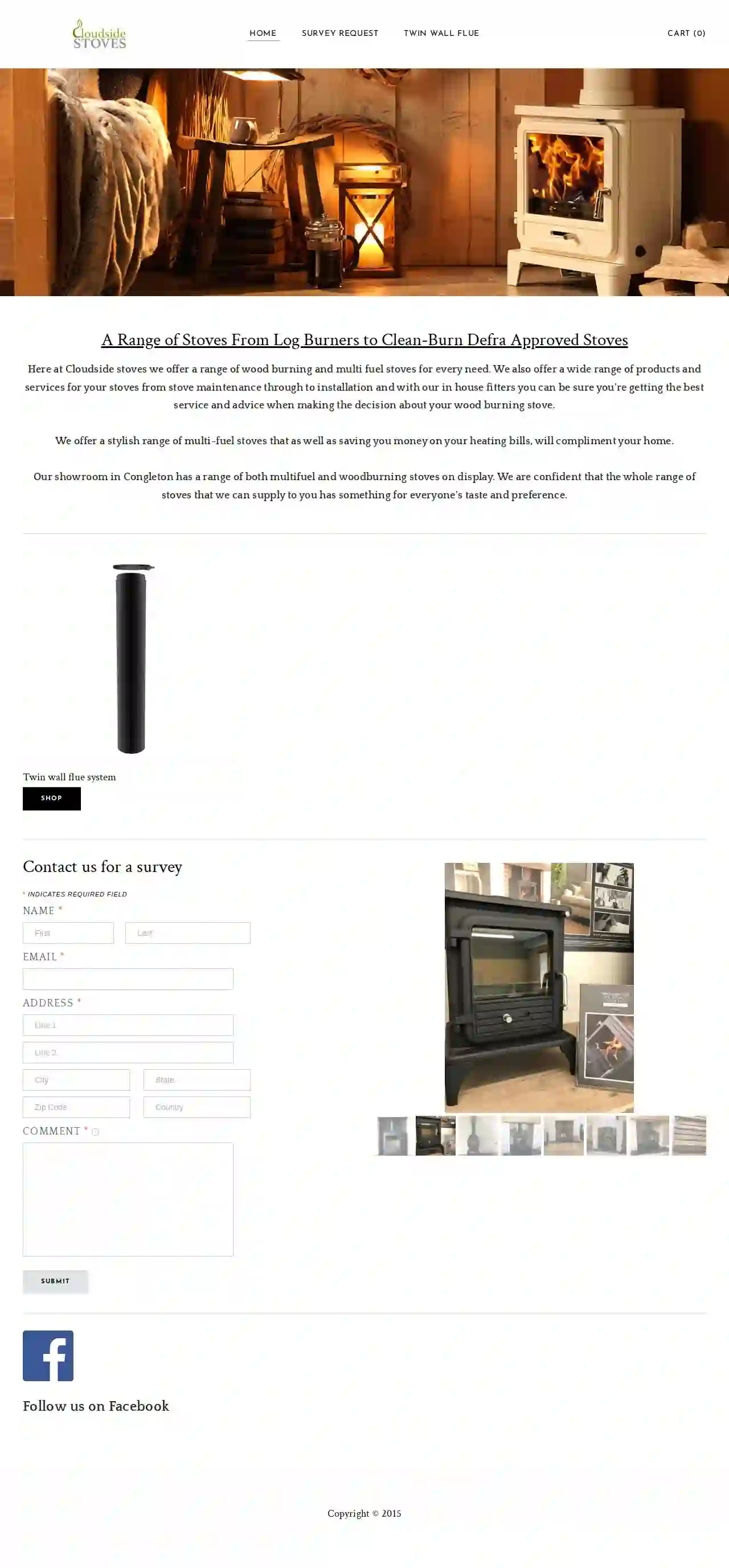
Cloudside Stoves, Congleton
3.97 reviewsCongleton, GBHere at Cloudside stoves we offer a range of wood burning and multi fuel stoves for every need. We also offer a wide range of products and services for your stoves from stove maintenance through to installation and with our in house fitters you can be sure you're getting the best service and advice when making the decision about your wood burning stove.We offer a stylish range of multi-fuel stoves that as well as saving you money on your heating bills, will compliment your home.Our showroom in Congleton has a range of both multifuel and woodburning stoves on display. We are confident that the whole range of stoves that we can supply to you has something for everyone's taste and preference.
- Services
- Why Us?
- Gallery
Get Quote
Autolock Ltd
4.129 reviewsMacon Way, Crewe, CW1 6DG, GBAutolock Ltd is a specialist vehicle workshop based in Crewe, Cheshire, with over 40 years of experience. They specialize in four main areas: ECU (control module) programming, car fault diagnostics, automatic/semi-automatic car transmissions (service/repair), and air conditioning. Autolock serves customers throughout Cheshire, Staffordshire, Lancashire, Merseyside, and North Wales, including the general public and main car dealers. They pride themselves on their highly trained and experienced technicians who utilize the latest automotive diagnostic capabilities to provide efficient solutions.
- Services
- Why Us?
- Accreditations
- Gallery
Get Quote
Heatshield Ltd
56 reviews189a Queen Street, Crewe, CW1 4AU, GBHeatshield was founded in 2002 and are a family run Plumbing, Heating & Electrical company, based in Crewe. We have a very friendly and efficient team of Office staff as well as an extremely experienced team of Gas Engineers & Electricians who complete all their work to the highest standard and providing excellent Customer Service. We work for various new builds around Staffordshire & Cheshire working for some of the most recognised house builders. We also work for numerous different Letting Agents completing Certificates and Repairs in their rentals.
- Services
- Why Us?
- Gallery
Get Quote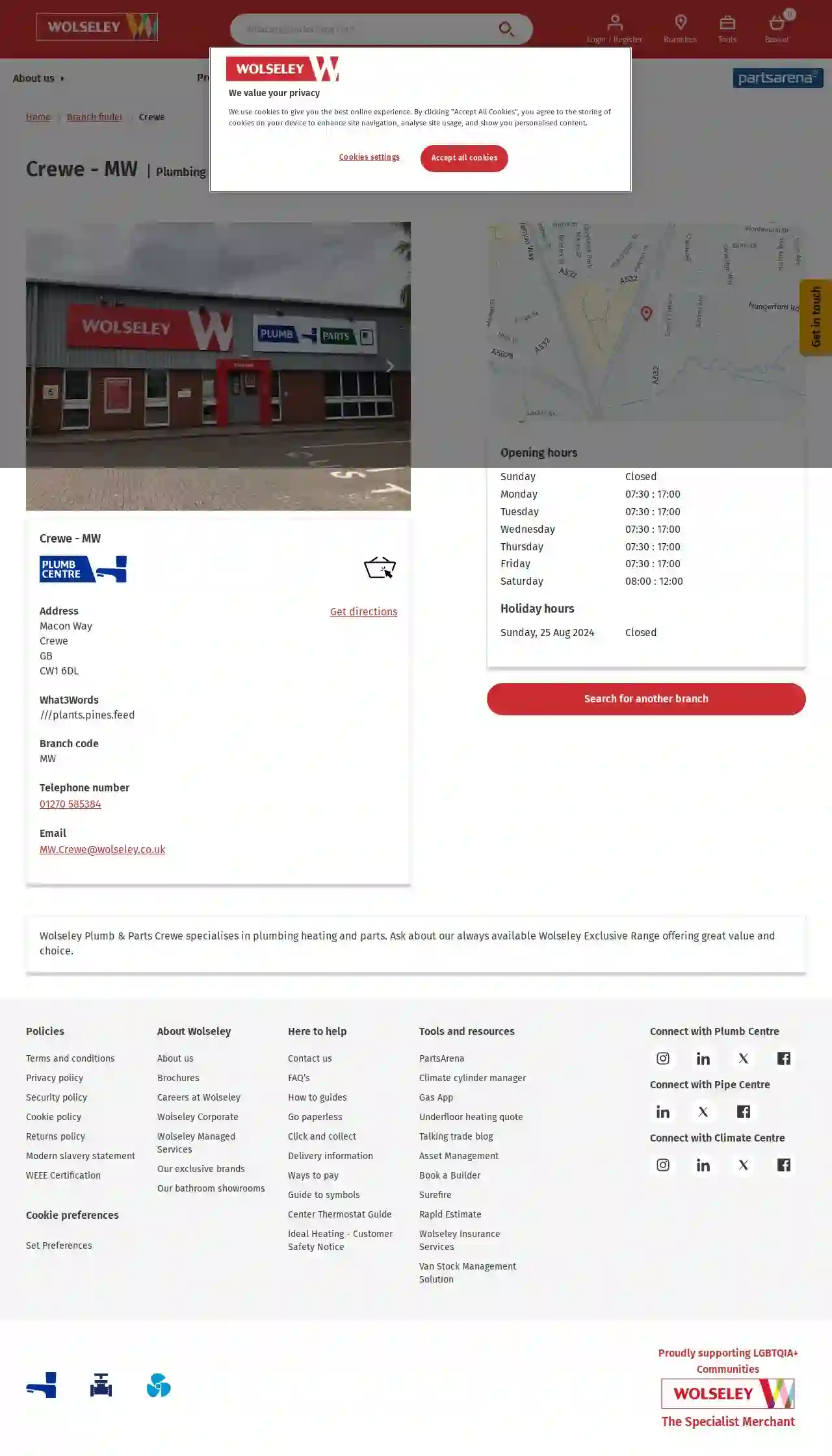
Wolseley Plumb & Parts
3.73 reviewsMacon Way, Crewe, GBCW1 6DL, GBWolseley Plumb & Parts Crewe specialises in plumbing heating and parts. Ask about our always available Wolseley Exclusive Range offering great value and choice.
- Services
- Why Us?
- Gallery
Get Quote
NovaTherm Ltd
518 reviewsUnit 9-11, Withyfold Trading Estate, Withyfold Drive, Macclesfield, SK10 2ZR, GBWelcome to NovaTherm, a supplier of premium underfloor heating products. Our team has over 50 years combined experience in the plumbing and heating sector. We aim to provide products and services of the highest quality that aid in providing a more sustainable future for the world around us. As governments work towards attaining carbon neutral footprints, our team strives to educate customers on the benefits of sustainability and offer products at the best value for money. We have an in-house team of professional designers for underfloor heating systems and offer a free no-obligation design and quotation service. Our aim is to supply customers with a quality floor heating system that meets their individual requirements quickly and at a price that offers the best value for money.
- Services
- Why Us?
- Gallery
Get Quote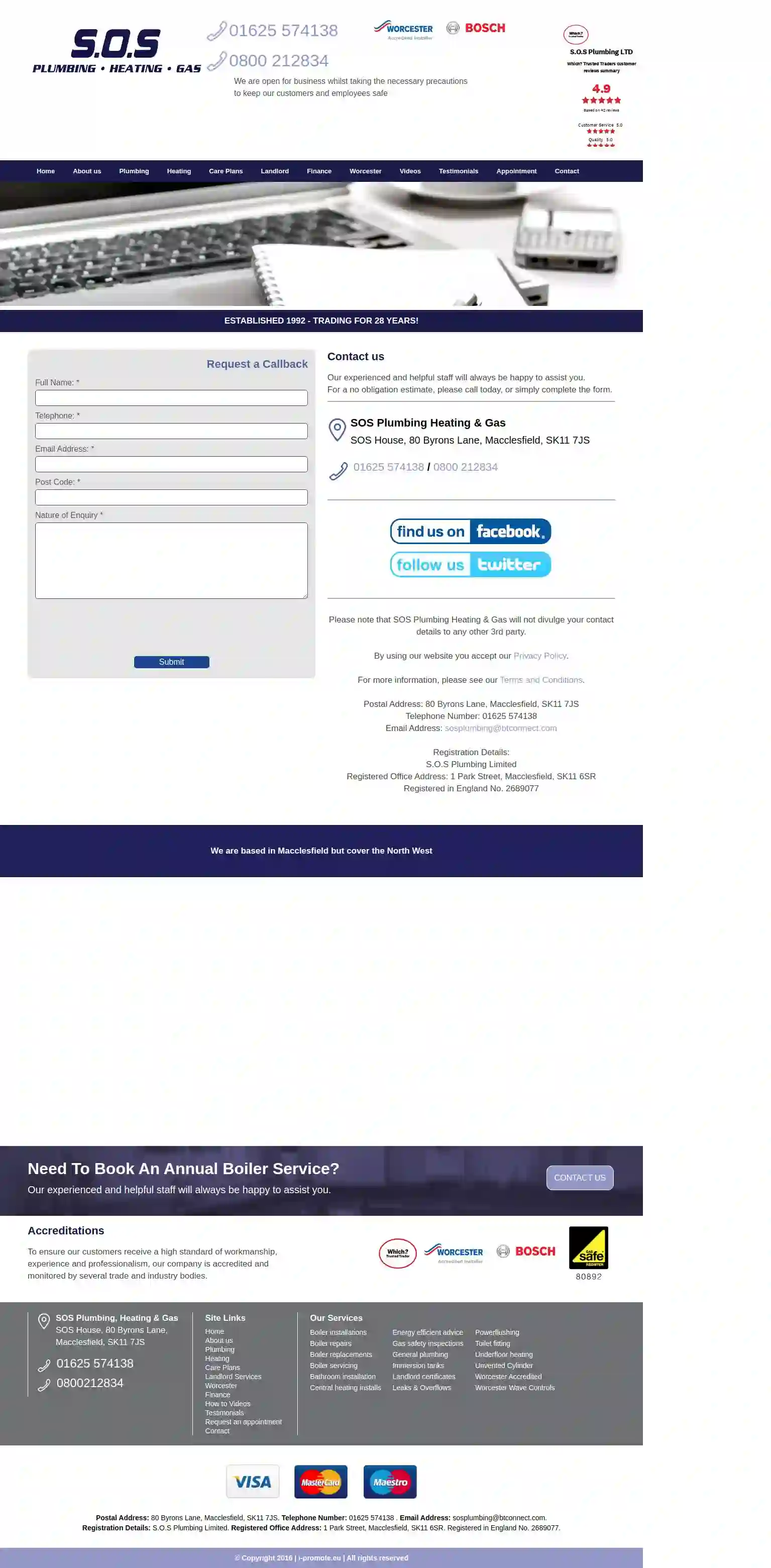
SOS Plumbing
51 reviewsSOS House, 80 Byrons Lane, Macclesfield, SK11 7JS, GBESTABLISHED 1992 - TRADING FOR 28 YEARS! S.O.S Plumbing was established in 1992. We have trading across the North West for 28 years in order to offer a quality plumbing, heating and gas breakdown service and maintenance company. 28 years later and we are still working to the same principles, providing a top class service to thousands of customers along the way. We have always, and still do, pride ourselves on our prompt, reliable, courteous and knowledgeable services. We pride ourselves in being an innovative company, keeping up to date with the latest products and systems to save our customers money and protect the environment. All our work is carried out by our own Gas Safe Registered engineers who all work to the highest standard with the minimum amount of disruption. We promise our customers the same high standard of service that our reputation has been built on for the past 28 years.
- Services
- Why Us?
- Accreditations
- Gallery
Get Quote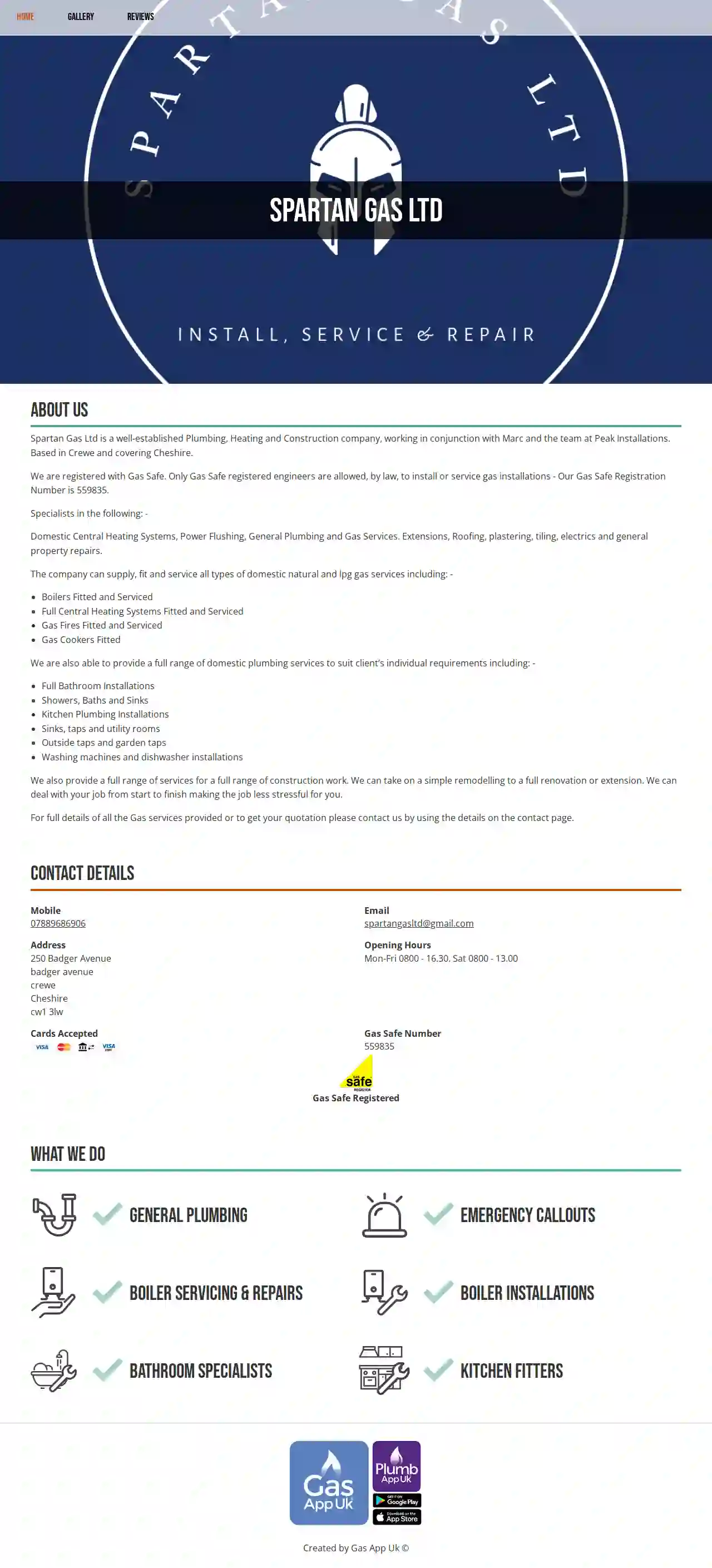
MJW Gas, Plumbing & Property Services
1.85 reviewsBadger Avenue, 250 Badger Avenue, Crewe, CW1 3LW, GBSpartan Gas Ltd is a well-established Plumbing, Heating and Construction company, working in conjunction with Marc and the team at Peak Installations. Based in Crewe and covering Cheshire. We are registered with Gas Safe. Only Gas Safe registered engineers are allowed, by law, to install or service gas installations - Our Gas Safe Registration Number is 559835. Specialists in the following: - Domestic Central Heating Systems, Power Flushing, General Plumbing and Gas Services. Extensions, Roofing, plastering, tiling, electrics and general property repairs. The company can supply, fit and service all types of domestic natural and lpg gas services including: - Boilers Fitted and Serviced, Full Central Heating Systems Fitted and Serviced, Gas Fires Fitted and Serviced, Gas Cookers Fitted. We are also able to provide a full range of domestic plumbing services to suit client’s individual requirements including: - Full Bathroom Installations, Showers, Baths and Sinks, Kitchen Plumbing Installations, Sinks, taps and utility rooms, Outside taps and garden taps, Washing machines and dishwasher installations. We also provide a full range of services for a full range of construction work. We can take on a simple remodelling to a full renovation or extension. We can deal with your job from start to finish making the job less stressful for you.
- Services
- Why Us?
- Accreditations
- Gallery
Get Quote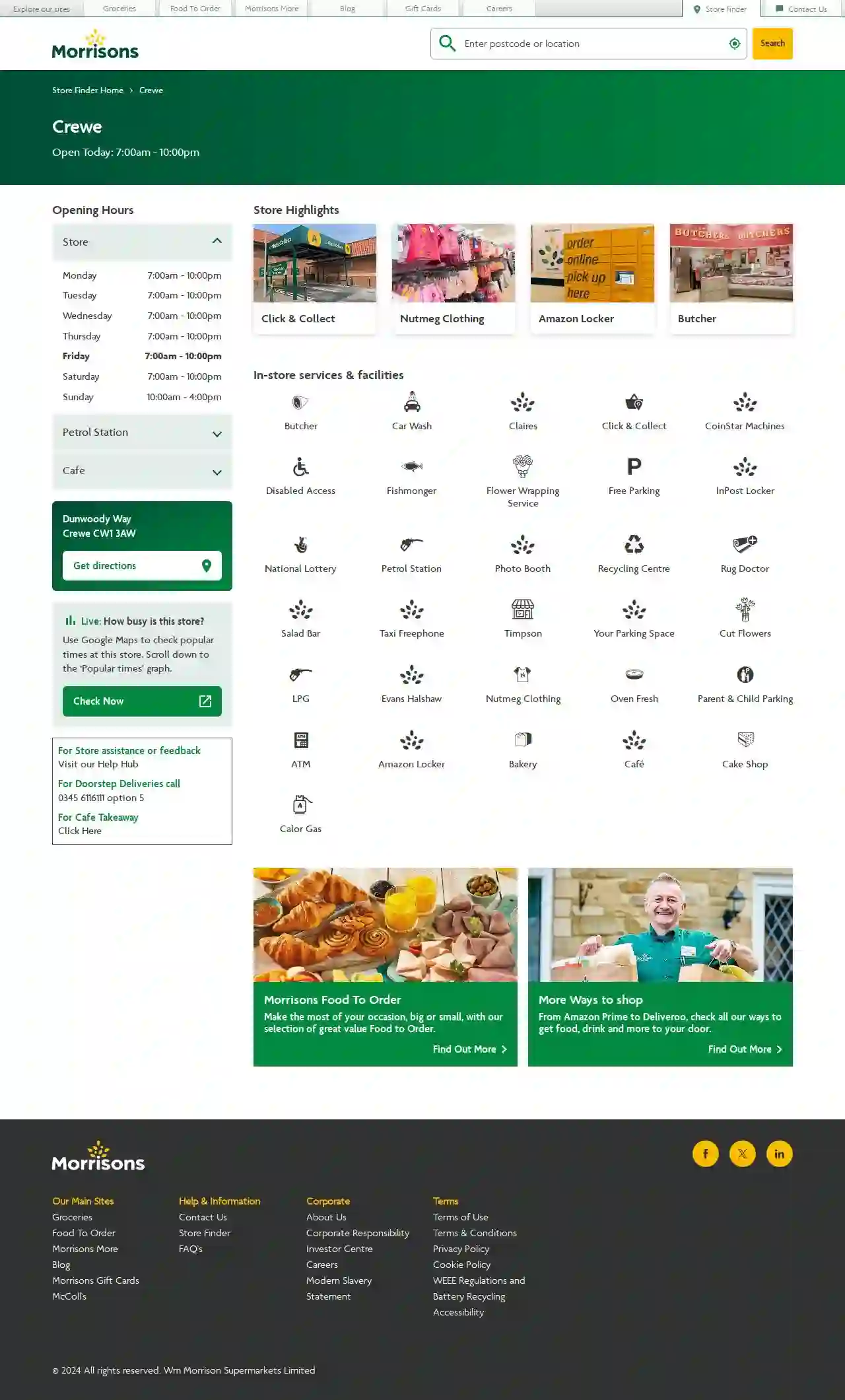
Morrisons
4.1Dunwoody Way, Crewe, CW1 3AW, GBMorrisons Crewe is your local supermarket, offering a wide range of groceries, fresh produce, and more. We're open 7 days a week, with extended hours for your convenience. Our friendly team is always on hand to help you find what you need. We also have a petrol station, cafe, and click & collect service available.
- Services
- Why Us?
- Gallery
Get Quote
The Floor Heating Warehouse
4.19 reviewsUnknown, GBThe Floor Heating Warehouse Ltd is a professional design, supply, and consultation company specializing in water underfloor heating and electric underfloor heating systems. We offer a wide range of products and services, including design and quotation, free quotations, and customer comments and reviews. Our team is dedicated to providing the best possible solutions for our customers, with a focus on quality, reliability, and customer satisfaction.
- Services
- Why Us?
- Accreditations
- Gallery
Get Quote
AC Comfort Air Conditioning
514 reviewsCrewe, GBAC Comfort is a company dedicated to providing high-quality air conditioning and ventilation solutions for both domestic and commercial clients. With over 8 years of experience in the industry, they offer a comprehensive range of services, including installation, repairs, and maintenance. Their team of experts is committed to delivering tailored solutions that meet the specific needs and budgets of each customer. AC Comfort prides itself on using cutting-edge technology and equipment from leading manufacturers like Fujitsu and Mitsubishi. They hold FGAS certificates, ensuring compliance with industry regulations and safety standards. Customers can benefit from a 5-year warranty on installations performed by AC Comfort. The company emphasizes personalized service, providing free consultations to assess individual requirements and develop customized installation projects. During these consultations, AC Comfort representatives evaluate installation costs, implementation timelines, and potential energy savings. AC Comfort's commitment to quality, safety, and customer satisfaction makes them a reliable choice for all air conditioning and ventilation needs.
- Services
- Why Us?
- Gallery
Get Quote
Over 12,692+ HVAC Contractors on our directory
Our HVAC companies operate in Wistaston & beyond!
HVACCompaniesHub has curated and vetted the Best HVAC Businesses in and around Wistaston. Find the most reliable contractor today.
Frequently Asked Questions About HVAC Companies
- Warm Air: The most noticeable sign is that the AC is blowing warm or lukewarm air.
- Ice Buildup: Ice may form on the refrigerant lines or evaporator coil.
- Increased Energy Bills: Your system has to work harder to cool, leading to higher energy consumption.
- Hissing or Bubbling Sounds: These sounds can indicate a refrigerant leak.
- Reduced Airflow: Noticeably weaker airflow from your vents.
- Dusty Vents: Dust accumulation around your vents.
- Increased Dust: More dust than usual in your home.
- Allergies or Respiratory Issues: Worsening allergy symptoms or respiratory problems.
- Higher Energy Bills: Your furnace becomes less efficient.
- Overheating: The system overheats due to restricted airflow.
What is the best temperature to set my thermostat in summer?
What is an AFUE rating, and why is it important?
What are the signs my air conditioner needs refrigerant?
How can I tell if my furnace filter needs changing?
What is the best temperature to set my thermostat in summer?
What is an AFUE rating, and why is it important?
What are the signs my air conditioner needs refrigerant?
- Warm Air: The most noticeable sign is that the AC is blowing warm or lukewarm air.
- Ice Buildup: Ice may form on the AC unit.
- Increased Energy Bills: Your system has to work harder to cool, leading to higher energy consumption.
- Hissing or Bubbling Sounds: These sounds may suggest a refrigerant leak.
How can I tell if my furnace filter needs changing?
- Reduced Airflow: Noticeably weaker airflow from your vents.
- Dusty Vents: Dust accumulation around your vents.
- Increased Dust: More dust than usual in your home.
- Allergies or Respiratory Issues: Worsening allergy symptoms or respiratory problems.
- Higher Energy Bills: Your furnace becomes less efficient.
- Overheating: The system overheats due to restricted airflow.